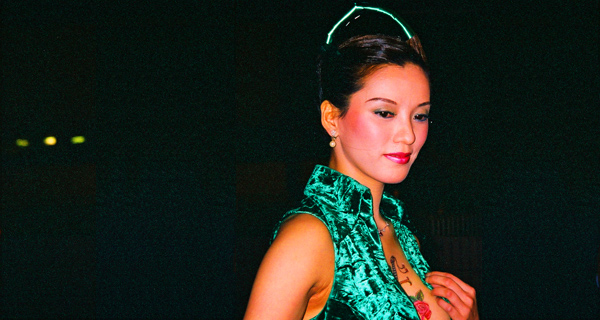I was busy all day on Friday and my evening was shaping up to be even more hectic. My first stop for the night was the kick-off event for Sonatrope, a new film festival featuring mostly Punk Rock and Hip Hop related movies. Arriving at the venue a little before nine, there was a torrent of people pouring into the building. Reaching the 14th floor and paying my $40, the space was already packed. With few seats, most of the crowd was sitting on the floor, literally rubbing up against one another. It was a fitting start to an underground film fest! Though it was uncomfortable, the crowd was enthusiastic and didn’t complain.
The night featured a screening of the opening film, Squatterpunk, followed by several live musical performances. I had to attend other events, but fortunately I was able to catch this unique and poignant film. Read on for a review!
After a brief introduction by Becky, Sonatrope’s founder, the film Squatterpunk began.
Squatterpunk features a roving camera moving around a Manila slum. At times it follows a bunch of boys as they wander throughout the day, entertaining themselves. The black and white footage captures the abject poverty and squalid conditions that they live in. Extensive footage shows them playing in water that is filled with trash. (For Godzilla fans, it’s worse than the sludge that gave birth to the smog monster.)
The camera follows them as they nonchalantly dive into the filthy water as if it were a backyard pool. One interesting note is that there are almost no adults shown in the film. Likewise, there is also no dialogue, but the film is backed by music from a number of Philippino punk bands including The Wuds and The Brockas.
The synopsis says that the film is about the life of youths “living the punk lifestyle” which isn’t accurate. The kids shown in the film are leading the same hard-scrabble upbringing of children in poverty everywhere. Footage of the kids rolling an old tire down a dusty road, and walking on pipes – could have been captured in the same way for the past two hundred years. Saying they are “living the punk lifestyle” implies choice, which is a luxury these kids simply don’t have.
Though the settings of the visuals don’t change much, it’s still powerful and surprisingly engaging. Partially, this is because the editing is done well. There are moments of joy, such as a makeshift dance contest in which the kids improvise moves to the enjoyment of everyone in a tightly packed room. But this joy is counterbalanced by close-ups of the festering soars on the legs and feet of one of the children.
Squatterpunk is a triumph in that it gets viewers to sit through footage of extreme poverty and exposes harsh conditions by packaging it with a punk soundtrack. Most people will not elect to watch a film of a band of poor kids going through their daily routines, but, wrap it in a punk soundtrack, and it becomes something altogether different.
One question I had while watching the film was answered later in the movie. The central figure has a mohawk hairstyle, which is the closest tie-in with punk culture throughout the film. I wondered whether the kid had it naturally, or was it orchestrated? It turns out it was arranged, as they show the boy being given the haircut in one segment of the film. At what point then does it become exploitational?
Hey kid, can you jump in that pile of trash over there for a dollar? It makes the film stronger visually to have the main kid have a discernible punk style, but is it ethical?
That particular issue aside, the fact that the film makes such grim conditions marketable and viewable by larger audiences is a feat worth praising.
